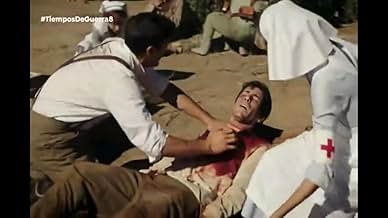Tiempos de guerra
- Série télévisée
- 2017
- 1h 10min
NOTE IMDb
7,5/10
3,4 k
MA NOTE
Ajouter une intrigue dans votre langueIn the Spanish city of Melilla, during the Rif War of the 1920s, Spanish volunteer nurses of Red Cross with no experience adapt to their new lives.In the Spanish city of Melilla, during the Rif War of the 1920s, Spanish volunteer nurses of Red Cross with no experience adapt to their new lives.In the Spanish city of Melilla, during the Rif War of the 1920s, Spanish volunteer nurses of Red Cross with no experience adapt to their new lives.
- Récompenses
- 1 nomination au total
Parcourir les épisodes
Avis à la une
Interesting to look at how some Spanish people may view their past (very similar to the pro-aristocracy BS in Downton Abbey). Of course right wing nostalgia is back in vogue in both the UK and Spain....anyway it's still quite entertaining - particularly if you want something light..
Hi there.
We're currently on the 4th episode of the 1st season and so far so good. It reminds me of a good, old fashion soap opera. The sets are quite elaborate and we're enjoying the outdoor location scenes a lot.
I usually change the channel when I see a show with subtitles but decided to tough it out for the sake of my mother who is truly enjoying the show,
As per my question, I was wondering what year it was shot and more importantly, is there going to be a 2nd season? If so, can you tell me when it starts?
Thanks in advance,
Lori
This was my first experience of a Spanish Netflix series and I really enjoyed it. The theme is very telenovela, with lots of drama and crisis points, but very entertaining and well paced. The acting is excellent and the characters are believably portrayed. The attention to the period, and the detail in the 1920s hospital setting is amazing. In some episodes I found myself concentrating more on the fixtures of the scene than the acting itself! There are a few authenticity gripes, as other reviewers have noted, particularly with regard to medical procedures but nothing that detracts too heavily. The worst problem is the contrived and badly constructed English audio. I watched with sub titles and English audio, and the audio NEVER matched the wording of the sub titles. Even worse, the audio voices were corny and poorly 'acted'. Very often the audio fell into a modern day American slang, which totally jarred with the elements of the scene. Netflix's shoddy work on the audio is very disappointing as it prevents the series from getting a great rating.
Loved this show. Hope there is a season 2 :)
I really enjoyed the acting, the story lines, the history, costumes and locations.
I have to thank Netflix for bringing such enjoyable content from this beautiful country. After my first foray into Spanish Series/Movies with Grand Hotel I have watched a lot of Spanish movies and shows and I must say they excel in bringing periods alive in their shows. Grand Hotel did it beautifully and this drama is a close second. The foremost thing these period drama's have managed is to bring a lot of emotions together with culture and a solid story.
As it is a fictional drama of course it is not complete factual retelling of actual history, but it's also not fluff. They cater to an intelligent, I would say mostly female audience, but an audience who like a dose of romance, suspense and also intelligent story telling and compelling dialogues. This exact mix has in my opinion been missing from most US content therefore filling the gap nicely. Highly recommend this drama.
As it is a fictional drama of course it is not complete factual retelling of actual history, but it's also not fluff. They cater to an intelligent, I would say mostly female audience, but an audience who like a dose of romance, suspense and also intelligent story telling and compelling dialogues. This exact mix has in my opinion been missing from most US content therefore filling the gap nicely. Highly recommend this drama.
Le saviez-vous
- GaffesIn the opening credits there are animated drawings. One such animated drawing depicts an entire rifle shell (the bullet and the attached casing) as a single moving projectile. Further, it shows the entire shell passing through a man's lower leg and emerging whole (bullet with casing attached and the bullet not deformed) on the other side of the leg.
This is not how this ammunition works. The casing (the shell's casing) never leaves the firearm; only the bullet travels down the barrel and is expelled through the muzzle of the firearm.
Obviously the production people have no knowledge of how firearm ammunition functions.
- ConnexionsReferenced in El hormiguero: Amaia Salamanca y Álex García (2017)
Meilleurs choix
Connectez-vous pour évaluer et suivre la liste de favoris afin de recevoir des recommandations personnalisées
- How many seasons does Morocco: Love in Times of War have?Alimenté par Alexa
Détails
- Date de sortie
- Pays d’origine
- Langues
- Aussi connu sous le nom de
- Morocco: Love in Times of War
- Lieux de tournage
- Tenerife, Canary Islands, Espagne(Location)
- Sociétés de production
- Voir plus de crédits d'entreprise sur IMDbPro
- Durée
- 1h 10min(70 min)
- Couleur
Contribuer à cette page
Suggérer une modification ou ajouter du contenu manquant





































